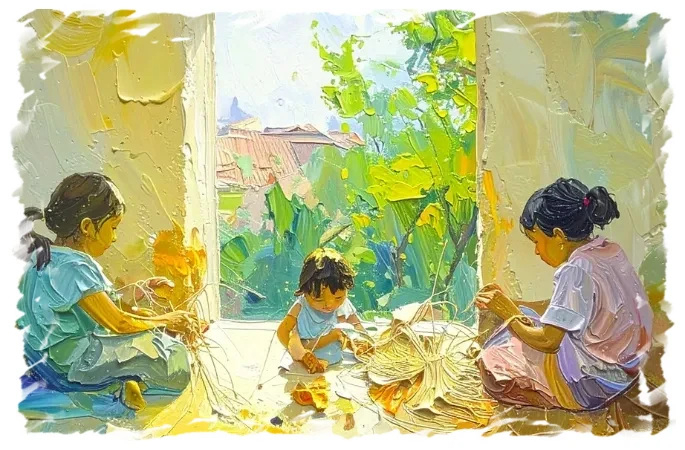It was a dark room full of voices. I sensed their buzz and energy even before I made anyone out. Maybe I was taken in by the sudden change too. We had travelled for some time and finally, suddenly arrived.
H and I had travelled for over an hour in the afternoon heat. First I discovered he walked with a tremendous speed. And as his new, much younger colleague, I was keen to keep up. Luckily, we just walked about 20 minutes. Then a bus, then an auto, another walk. I thought we were only going from one part of Navi Mumbai, our NGO office, to another, where M lived. But as we travelled, I wondered how much longer.
A walk down a mud track for a few minutes. And we suddenly reached a solitary cemented structure among the dense grass and trees. Roughly plastered walls, with a creaking door that let us in. The room of many voices.
As my eyes adjusted to the darkness after the intense light, I made out their source. Many children jumping excitedly. Were there 3? 5? No, a sleeping baby too … I was distracted from my counting by the few children now surrounding me. Clearly my entry had excited some of them. One of them pulled at my right hand playfully. Another almost bumped into my side.
We spent the next few minutes making introductions and explaining why I was there. A call had been made earlier, so they were expecting us. We were here to meet M, a 12-year-old from the family, still expected from school. These were her siblings and cousins surrounding us. And in the room were M’s mother, aunt and grandmother too. M had a playtime routine and I had come to document it.
The family was excited that we had come to talk to M. What will we do with this story? We explained, and once M arrived, we sought her consent too.
And then she started.
‘First we dug a hole. Then we got sticks together for the frame of the house. We had to cut them precisely with a spear. Then we tied the sticks together with a string. We attached paper on the roof of the house. Now it was ready to be used,’
M and her siblings played a game of setting up house as most children growing up do. Except their regular experience of forced evictions and losing home made them mirror this interaction at play time too. In M’s area, evictions had suddenly ramped up, from once every two years to once every two months now. Families often ended up taking out their own homes; leaving it to the government meant far more brutality and loss.
M and her siblings had watched their parents build and take down their homes many times. So this was how they played now. M was shy but matter-of-fact. ‘We built a house two weeks ago while playing’, she said. But that day they needed something more to light the fire and cook. So their house came down.
M’s words were simple, and though I had prepared, I struggled to ask any more. My questions seemed silly or unnecessary. She continued and I just tried to receive her words well. Sharp goosebumps pricked my arms and I hoped no one saw. Was I more shocked with her experiences or her calm retelling of it?
We were now talking about the room we sat in.
‘Our basti is not livable in the monsoon. Snakes and scorpions enter the house. Some people have even drowned in the pits contractors made between evictions, to force us to leave for good. I miss my friends, but this house is safer now’, M said, explaining it all.
The family had managed to rent this room for a few weeks. It was further from M’s school and she travelled alone, making her parents anxious for her safety. But there was no other way for now.
M’s aunt took up on the frequent evictions faced. ‘Sometimes we can’t even take leave when they come to break down our houses. Who will give us so much leave, ye tod-mod toh chalta rehta hai. Bacche saaman uthate hai’, she said. M added how one time, running during an eviction, a nail lodged in her foot. Her grandmother ran to help her and received blows from the authorities. ‘They thought I was trying to get past their cordon’, she said.
Our conversation had perhaps made the other children feel more free. ‘Isko toh potty aata hai uss time, tension mein’, one of them giggled pointing at another.
I had entered knowing M’s play routine. And yet I left with an unreal sense, now knowing yet unable to absorb its full impact. This recurring story for India’s many poor families and their children is courage and persistence in bold letters. Yet we more often receive it as ‘encroachers’ or ‘illegal citizens’, even as they are pushed to more marginal spaces daily, quite literally and otherwise too. I hope one day we can turn the letters around to spotlight COURAGE in all caps. Especially when it involves tearing up and building home time and again.
I wrote this essay in response to the prompt ‘An Act of Courage’ at the Ochre Sky Memoir Workshop in early April 2024.



